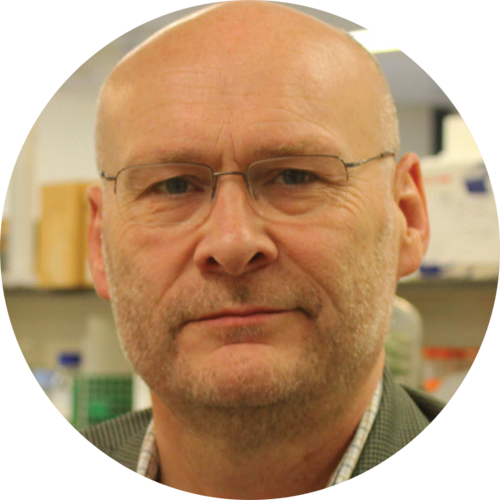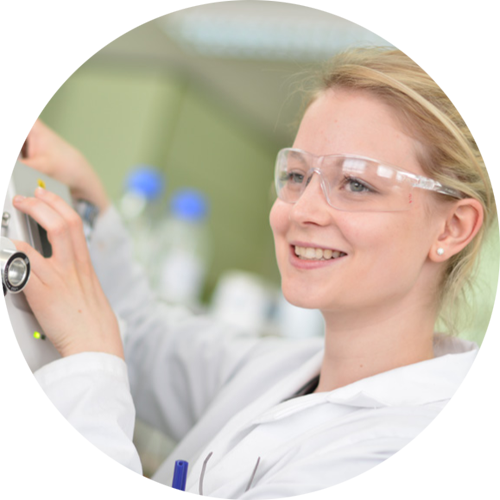
Q: What is the focus of your lab’s research?
A: Our research is focused on developing and exploiting chemical tools and principles to address questions in plant and microbial carbohydrate biochemistry. Projects typically involve some combination of chemical and enzymatic synthesis, inhibitor design and assessment, biochemistry, structural biology and omics analyses.
Q: What was your previous workflow or challenges?
A: We synthesize a lot of different molecules in the lab, many of which have relatively low molecular weights. To acquire low resolution MS spectra of purified compounds we relied on MALDI-TOF or on direct injection into an expensive LC-MS system (ESI). Access to these instruments required booking in advance and there was also often a delay in obtaining results.
Q: Why did you incorporate the expression® CMS into your lab?
A: We wanted an instrument that would allow rapid access to low resolution MS data for low molecular weight compounds. Immediate access to this instrument allows rapid confirmation of product formation in chemical and ezymatic syntheses; the Compact Mass Spectrometer (CMS) is particularly useful for rapid identification of analytes from LC separations. All of this can be done by direct injection but in our lab the injection from a TLC silica plate using the Advion Interchim Scientific Plate Express™ is being increasingly used as a faster alternative. The APCI ion source is another great capability of the CMS, particularly for analysis of lipophilic compounds such as triterpenes, which we have experienced difficulties in analysing by other ionisation techniques.
Q: Who would you recommend to purchase the expression® CMS?
A: Any group working with organic molecules that requires fast access to low resolution MS spectra. We would especially recommend coupling the expression® CMS with the Plate Express™ for labs that routinely use TLC for monitoring chemical syntheses and biotransformations.

Q: WHAT IS THE FOCUS OF YOUR LAB’S RESEARCH?
A: The Liverpool School of Tropical Medicine (LSTM) is dedicated to research and teaching on tropical diseases. We are helping improve the health of some of the poorest people in the world by carrying out scientific research and developing treatments that will directly benefit them.
Specifically, I work in the department of parasitology, where our focus is on the key tropical parasites such as malaria, TB and filarial worms.
Q: WHY DID YOU INCORPORATE THE EXPRESSION CMS INTO YOUR LABORATORY?
A: The expression was originally purchased to save us from a 15-minute walk to get simple MS data at the University’s main analytical service. Also, it is compact and very easy to use, you do not need to be an expert in MS to generate very useful and meaningful data.
Q: HOW DO YOU USE THE EXPRESSION CMS?
A: We use the expression in the direct injection configuration for checking whether reactions have worked and whether the next purification and/or reaction steps are worth proceeding.
Before we got the expression, we either had to walk across campus to use the central service or continue without any knowledge as to whether our reactions had worked. The expression saves us time and boosts our overall research performance.
I am also planning to use it for some simple metabolism studies in the near future.

Q: WHAT IS THE FOCUS OF YOUR LAB’S RESEARCH?
A: As part of the Archibald research group our main research area is developing radiopharmaceutical compounds for medical imaging and targeted protein binding molecules for therapeutic applications.
Specifically, I am working on synthesising radiotracers to target the CXCR4 chemokine receptor which has been shown to be overexpressed in 23 different types of cancer.
Q: WHY DID YOU INCORPORATE THE EXPRESSION CMS INTO YOUR LABORATORY?
A: The expression CMS was purchased as we are a large research group and it is more cost and time effective to be able to carry out rapid MS analysis in situ for some sample and to use the University’s analytical service only for more complex analyses that are less time sensitive. The expression CMS fits nicely onto the bench top, performs all the functions needed for general day to day use, and is easy to use and maintain.
Q: HOW DO YOU USE THE EXPRESSION CMS?
A: We use the expression CMS to monitor chemical reactions, check for by-products and gauge the purity of our products. We have the TLC-MS interface which is extremely useful in identifying compounds straight from the TLC plate. Personally, I have used the expression CMS to examine fractions from a column to identify exactly when my product was being eluted, which would not have been possible previously. Purchasing the expression CMS has undoubtedly saved our group a great deal of time and has helped advance our research.
With the emergence of new protein therapeutics, including biosimilars, biobetters and ADCs, peptide mapping by LC/MS is becoming more commonly used for the identification of post-translational modifications (PTMs), glycosylation, and conjugation sites, as well as primary sequence confirmation.
The purpose of this study is to provide guidelines for developing optimal LC running conditions with Aeris™ PEPTIDE core-shell HPLC/UHPLC columns and determine the feasibility of transferring a method developed on UV to MS simply by adjusting the acidic modifier in the mobile phase.

Q: WHAT IS THE FOCUS OF YOUR LAB’S RESEARCH?
A: The Drug Discovery Unit (DDU), based at the University of Dundee, is an independent, fully integrated Drug Discovery Group that works across multiple disease areas. We are active in areas of unmet medical need and bridge the gap between academic research and industrial drug discovery. Our staff are multi-disciplinary and come from both Academic and Industrial backgrounds.
Q: WHY DID YOU INCORPORATE THE EXPRESSION CMS INTO YOUR LABORATORY?
A: We needed a mass spectrometer that was easy to install, operate and move as well as available at a reasonable price. We have had the instrument for over a year now and are very happy with it.
Q: HOW DO YOU USE THE EXPRESSION CMS?
A: We have the expression linked to an HPLC instrument and it is used as an open access system. The combination of UV purity data along with MS confirmation is incredibly powerful for our chemists. The instrument is networked so our chemists can then process and review data from their desks.
With decades of mass spectrometry and chemistry expertise, Advion Interchim Scientific has produced a family of compact mass spectrometers designed for the chemist. The affordability, small size and ease of use make them ideal for use directly at the chemist’s bench, giving immediate answers and informed decisions instead of waiting.
The Advion Interchim Scientific expression® compact mass spectrometer (CMS) is a fast and easy analytical tool for the organic chemist. Ideal for fast reaction monitoring, the expression® CMS features a single quadrupole that can adapt to multiple ionization sources in seconds, including both ESI and APCI. The mass spectrometer works in a variety of applications, including food and beverage, pharmaceutical, biomedical, peptides and proteins, drug discovery and more. The expression® CMS offers a variety of novel sampling techniques, including:
- Direct mass analysis of TLC plates in 30 seconds at the push of a button with Plate Express™
- One-touch analysis of solids and liquid samples with the ASAP® probe
- LC/CMS
- Many more options and configurations to suit your needs
Learn more about the different sample techniques available with the expression® CMS, including fast assay methods for liquids, solids, gases, and even air-sensitive compounds.
Fill out the form to download the full expression® CMS brochure now.
Aflatoxins (B1, B2, G1, G2) produced by certain fungi (Aspergillus flavus and Aspergillus parasificus) are toxic metabolites which have been associated with various diseases, such as aflatoxicosis, in livestock, domestic animals and humans throughout the world. Many methods can be used for Aflatoxins analysis, including TLC, HPLC, immunoassay, LCMS etc. Of all the methods, the LC/MS method is considered the preferred technique because of its high selectivity and sensitivity. In this presentation, a simple, cost effective LC/CMS analytical approach is described for the determination of Aflatoxins.
A combination of ion-ion interaction chromatography and a compact mass spectrometer presents a cost effective and powerful analysis system for the detection and quantification of amino acids in complex mixtures without the need for extra sample processing steps such as derivatizations.
Quantitation of Perchlorate by Ion Chromatography with Suppressed Conductivity on the expression CMS
Perchlorate is a synthetic chemical that is used in the manufacture of rocket fuel, fireworks, flares and explosives, and can also be present in bleaches and some fertilizers [1]. The EPA has devised drinking water regulations for Perchlorate to minimize its impact on human health and the environment.
Achieving lower analytical detection limits for Perchlorate in environmental matrices such as drinking water allows regulatory bodies like the EPA make better informed decisions on the degree of contamination of an environmental system, as well as the remedial actions required to limit adverse health and environmental effects.
The expression Compact Mass Spectrometer (CMS) provides lower detection limits and greater selectivity for Perchlorate compared to a conductivity detector (CD). The typical detection limit of a CD is in the mid to high-ppb range, the CMS can detect < 20 ppt.




